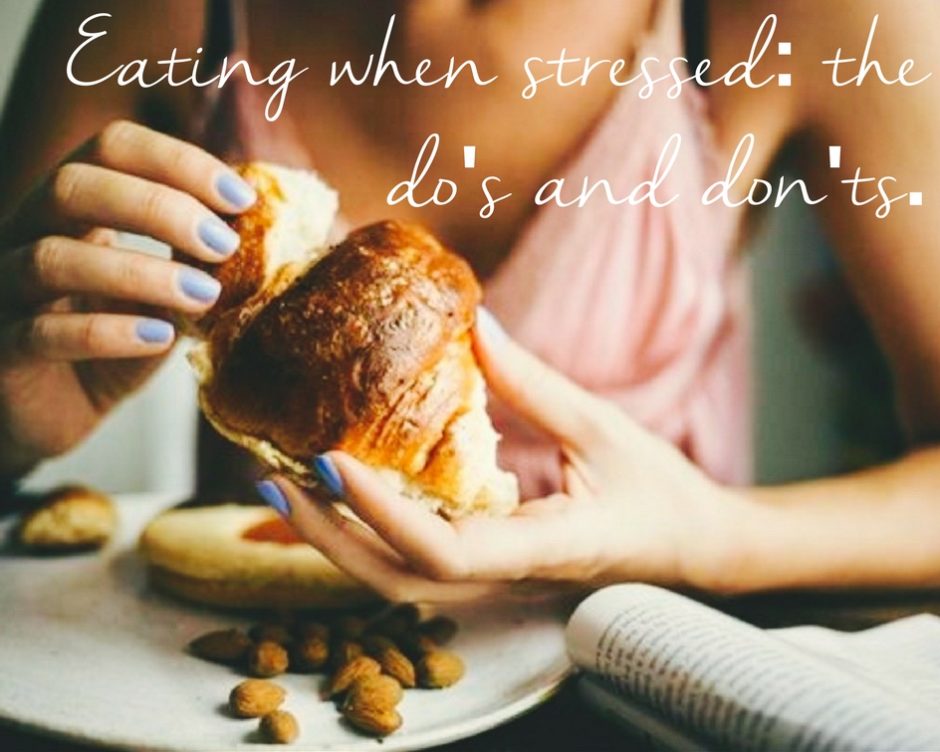 There can be two food related responses to stress and upset emotions – over eating, or not eating at all. Which is healthier? Should we avoid food at all costs when unhappy to avoid binging or should we be grounding ourselves with food at emotional times?
There can be two food related responses to stress and upset emotions – over eating, or not eating at all. Which is healthier? Should we avoid food at all costs when unhappy to avoid binging or should we be grounding ourselves with food at emotional times?
Let’s look at what happens to the body when we are ‘stressed’. Evolutionarily speaking, the human stress response was a mechanism that evolved solely in response to famine. Back in the hunter-gatherer days, there were not as many things to worry about as in modern life, except being killed by a predator or going without food. So the body evolved to see stress as a warning sign against famine. Naturally, the response it developed was to hold on to fat and weights in this situation, to try avoid emaciation.
We don’t usually have to worry about being chased by bears or going without food these days. Most of western civilization has access to more comfort and abundance than ever before. So what does stress look like today? In our modern world, stress can come from many more sources than before – in the forms of emotional / mental stress, sleep deprivation, dehydration, and shock to name a few. Stress can also describe an unhealthy relationship with one’s body – such as even a minor eating disorder, body discomfort, or fear of food. Yet even though our external stress triggers have multiplied since earlier times, our bodies pretty much react in the same way to each of these stressors. Yes, even anxiety at a meal time.
Every stressor we experience causes the same chemistry in our body that famine did. This chemical reaction functions as a protection mechanism – the body is trying to defend us! Although from the outside, it often seems like it’s just getting fat. Because yes, it is a biological fact that the body holds onto or gains weight easier in response to stress.
So should we be starving or dieting when we’re going through a hard time? Or eating foods that comfort us and calm us down from stress?
Here’s two factors to consider:
1) a stressed-out mind is less likely to be present with food and in tune with satiation hormones.
2) a stressed-out body in ‘fight-or-flight’ mode is less likely to digest and metabolize efficiently.
The first factor is why we often crave ‘comfort foods’ in hard times – the body is looking to ‘fill’ itself, to feel nourishment and satisfaction in place of an emotional void or pain. But this can often spiral out of control, which explains why binging is so common – it is an emotionally induced response to dissatisfaction or grief. When we are in an emotional state, it is virtually impossible to treat eating with the respect and presence it deserves – we become out of tune with the satiety hormone leptin, along with most of the natural responses happening in our body. When we are seeking external fulfilment, it is difficult to really focus inwards.
When we are stressed, the natural evolutionary ‘fight-or-flight’ response raises cortisol, a steroid hormone, to high levels in the body. Anyone who’s taken steroids for medical or muscle pumping purposes will know that they make you put on weight and body mass fast, while also making your appetite ravenous and impulsive. In this state of high cortisol levels, the parasympathetic nervous system virtually shuts down, i.e. the body’s housekeeping activities go on pause. If you are running from danger for example, your body wants to focus on many other activities such as pumping blood to your muscles to run faster, dilating your pupils to see clearer, and your heart rate rises as a result. Your body needs to conserve energy from unhelpful activities at this time, such as digestion and assimilation of nutrients. So when you’re in emotional turmoil or stressed, your body physically isn’t digesting properly, because it is focusing on handling and digesting whatever experience is causing the unrest.
So it’s clear that the body is not designed to ‘eat’ in a state of stress. If you lose your appetite during difficult times, it is likely because your body is aware it is not in a state to digest anything. If this sounds like you, honor your body’s wisdom. It would probably be better to avoid eating until you have calmed down and feel ready to digest it – so long as this is not out of a place of self-deprivation and harm. Or at least take half an hour to do some breathing before eating something small, grounding and easy to digest like a juice or smoothie. Help your body out. Yet if you find yourself reaching for junk food during these times, it is clear that the hunger is likely emotionally induced and won’t serve to let you nourish yourself properly. In this state, your best bet would be to make your body metabolize these stress hormones before attempting to digest any food that you’re craving.
The two biggest helpers in this situation are deep sleep and exercise – both of these activities help your body to metabolize excess cortisol and epinephrine to mitigate the stress response. Get the sleep you need, and don’t skimp on it – we all know the puffiness that follows a night out of no sleep. After all, it is proven that death from sleep deprivation occurs sooner than from starvation. If you know that high intensity exercise tends to stress your body out more, yoga or martial arts could be more beneficial. The idea is to get energy moving – as emotions are just energetic blockages after all. Meditation, laughter and positive distractions are also a wonderful way to relax the body and release emotions.
Focusing on these activities can literally rewire your endocrine system to have a healthier response and relationship with food. With all the external stressors we are surrounded by, it is so important to be aware and present regarding what else you take in; what you eat and how you eat it. We all sit to eat at least three times a day – that’s over 65,700 times in the average life span! Let’s make these occasions acts of nourishment.
If we start to learn how to have a healthy and intuitive relationship with food, our most fundamental need and activity, perhaps this attitude could leak into other areas of our life and help us digest and handle even the most difficult situations with more clarity. How we eat food is often an indication of how we eat life – let’s show up for every bite.
written by isabella gucci-ruffalo
